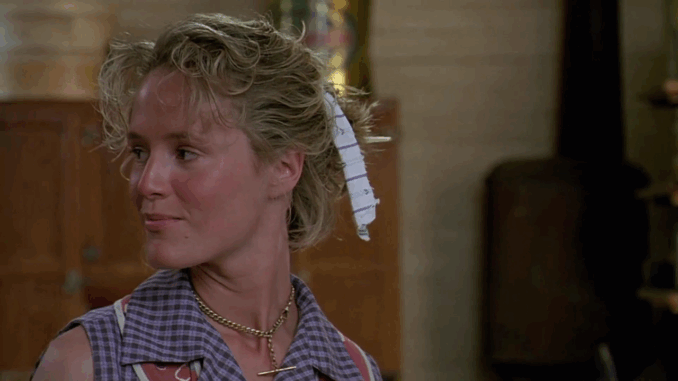
In the heart of Fried Green Tomatoes, nestled among stories of Southern grit and timeless friendship, lies one of the most profound and personal transformations in cinema: the metamorphosis of Evelyn Couch. Played with aching sincerity by Kathy Bates, Evelyn begins as a woman buried beneath decades of self-doubt and ends as someone who reclaims her voice — and her life.
But the turning point — the true ignition of her change — happens in a grocery store parking lot, with a cry that still echoes:
“Towanda!”
To understand Evelyn’s journey, we must look at who she was before that moment… and who she becomes after.
Evelyn Before: The Woman Who Apologized for Existing
At the start of the film, Evelyn is everyone’s afterthought.
-
Her husband, Ed, barely looks up from the TV.
-
She’s dismissed by salespeople, ignored by strangers, overlooked by society.
-
She tries everything to “fix herself”: self-help tapes, menopause guides, candy bar diets.
She is so conditioned to serve, she no longer knows how to want.
Evelyn represents millions of women who have lived their lives for others — mothers, wives, caretakers — who, when left alone, feel like they no longer exist at all.
She doesn’t just suffer from invisibility — she’s internalized it.
In one of the most poignant early scenes, Evelyn practices being assertive in her car — yelling fake arguments into the steering wheel. It’s both funny and heartbreaking. Because we see a woman who knows she’s disappearing, and is desperately trying to claw her way back to life.
The Towanda Moment: Breaking the Chains
Then comes the grocery store scene.
Two young women take her parking spot, mock her, and walk away without a second thought. This time, Evelyn doesn’t cry. She doesn’t leave. She doesn’t whisper “it’s fine.”
She hits the gas.
“Face it, lady. We’re younger and faster.”
“That’s okay, girls. I’m older, and I have more insurance.”
With every slam of the car, Evelyn smashes years of quiet compliance. This is not road rage — it’s soul rage. A reclaiming of space, of power, of identity.
This is when Evelyn gives birth to her alter ego:
Towanda: avenger of the invisible.

Evelyn After: The Woman Who Says What She Means
Post-Towanda, Evelyn doesn’t just change — she wakes up.
-
She starts expressing her desires, not just suppressing them.
-
She doesn’t let Ed ignore her — and when he does, she stops begging for scraps of attention.
-
She makes bold moves: taking care of Ninny, pursuing friendships, and embracing her life, not just her husband’s routine.
She even starts channeling her anger into something productive — like enrolling in self-improvement classes and standing up for herself in everyday encounters.
“I’m too young to be old and too old to be young,” she says.
“But I’m not going to disappear.”
What makes her transformation powerful is its relatability. Evelyn doesn’t become a superhero — she becomes herself. She doesn’t run away from her life — she rebuilds it, one brave act at a time.
The Deeper Meaning: Rage as a Tool for Healing
In a society that often equates femininity with patience, politeness, and silence, Evelyn’s act of explosive anger is radical. And it’s healing.
Psychologically, this moment can be seen as her releasing years of suppressed trauma — a kind of primal scream therapy in car-crash form.
And from that rupture, she grows.
Her rage doesn’t consume her. It frees her.
Evelyn as Everywoman
Evelyn’s story isn’t just hers. It’s a universal arc for so many women who wake up one day and realize they’ve been edited out of their own lives.
She’s proof that transformation isn’t reserved for the young or the fearless. Sometimes it begins in a parking lot. With a dented car. And a name screamed to the heavens.
“Towanda!” becomes more than a battle cry.
It’s a symbol of rebirth.
Fried Green Tomatoes gives us many heroines, but Evelyn is the most quietly revolutionary. Not because she changes the world — but because she changes herself.
Her journey reminds us: You’re never too late to become who you were meant to be.
Even if it takes a few fender benders to get there.
